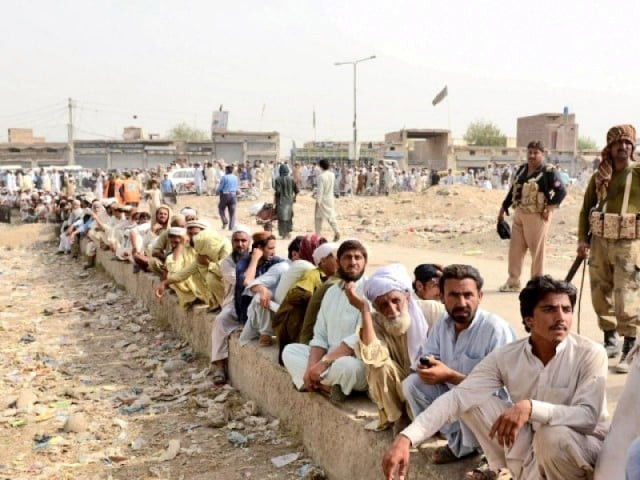75,000 IDP families rehabilitated, says report
Says all displaced people of FATA would go home in 2016

PHOTO: AFP
Over 75,000 families of internally displaced persons (IDP) from Federally Administered Tribal Areas (Fata) and Khyber-Pakhtunkhwa have been rehabilitated and returned to their areas of origin.
These statistics were revealed in a report, “Returning Home: Livelihoods and Food Security for Fata Returnees,” launched on Wednesday. The report further says that by mid-2016, all of the displaced would have returned home.
Pakistan spent $1.9 billion on Zarb-e-Azb, IDPs so far: FO
At present, more than one million people are displaced due to operations against militants in the tribal areas.
The report has been compiled as a joint initiative of the World Food Programme (WFP), Food and Agricultural Organisation (FAO), the International Rescue Organisation and the Food Security Cluster, in collaboration with Fata Secretariat.

“Whenever we plan for return and rehabilitation in this region, we have to set our context right – the context is not post-disaster return, but a return taking place after very successful counter-insurgency operations,” stated Fata Secretary Planning and Development Department Shakeel Qadir Khan, while speaking at the launch.
Details whittled down to facilitate IDP repatriation
He underscored the role of international community in helping the government defeat the curse of militancy and regaining a space lost over the last decade. “This is a unique return where rehabilitation is taking place in such a structured manner,” he added.
WFP Country Director Lola Castro said that return and displacement of people was taking place simultaneously. She mentioned that the idea was not just to ensure successful return, but also sustainable rehabilitation.
The report profiles the food security situation of families from the six Fata agencies, excluding North Waziristan and documents interventions to support returning families achieve recovery and establish a dignified living environment for their families.
IDPs returning as areas get denotified
Based on the analysis of the food security and livelihoods environment, the report reveals that the food security situation of the returnee population is fragile and closely linked to livelihoods.
Culturally appropriate activities for women
Food security for women is an area which requires focused attention, the report underlines, asking to engage women in activities that are culturally appropriate within the community, such as kitchen gardening, backyard poultry raising, or other home-based income-generating activities.
Cash grants for rebuilding houses have been deemed essential as most families upon return are living in kacha houses.
Published in The Express Tribune, December 10th, 2015.



















COMMENTS
Comments are moderated and generally will be posted if they are on-topic and not abusive.
For more information, please see our Comments FAQ